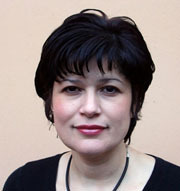

© Karolinska Institutet
筆頭著者のRochellys Diaz Heijtz博士
腸内の細菌が脳の発達に重要な役割を果たしているかもしれない。腸内の細菌叢が正常なマウスと細菌を持たない無菌マウスについて,成獣になってからの行動を比べると,無菌マウスはより活発で,より危険な行動をとった。脳の遺伝子を分析すると,腸に正常な細菌がないことが学習,記憶,運動の制御に関与するシグナル伝達経路に影響を及ぼしていた。神経伝達物質やシナプスの機能も腸の細菌に制御されていると考えられる。進化の過程で,腸の細菌叢の形成が脳の発達機序に組み込まれたのかもしれない。(吉田素子)
Bacteria in the Gut may Influence Brain Development
A team of scientists from across the globe have found that gut bacteria may influence mammalian brain development and adult behavior. The study is published in the scientific journal PNAS, and is the result of an ongoing collaboration between scientists at Karolinska Institutet in Sweden and the Genome Institute of Singapore.
The research team compared behavior and gene expression in two groups of mice - those raised with normal microorganisms, and those raised in the absence of microorganisms (or germ-free mice). The scientists observed that adult germ-free mice displayed different behavior from mice with normal microbiota, suggesting that gut bacteria may have a significant effect on the development of the brain in mammals.
The adult germ-free mice were observed to be more active and engaged in more 'risky' behavior than mice raised with normal microorganisms. When germ-free mice were exposed to normal microorganisms very early in life, as adults they developed the behavioral characteristics of those exposed to microorganisms from birth. In contrast, colonizing adult germ-free mice with bacteria did not influence their behavior.
Subsequent gene profiling in the brain identified genes and signaling pathways involved in learning, memory and motor control that were affected by the absence of gut bacteria, highlighting the profound changes in the mice that developed in the absence of microorganisms. This suggests that, over the course of evolution, colonization of the gut by microorganisms (in total 1.5 kilograms) in early infancy became integrated into early brain development.
[単語和訳]
Bacteria:細菌 Gut:腸 Brain:脳
from across the globe:世界中から(参加した) mammalian:哺乳類の PNAS:雑誌「Proceedings of the National Academy of Science(米国科学アカデミー紀要)」の略称 ongoing:進行中の collaboration:協力 Genome:ゲノム
gene expression:遺伝子発現 mice:マウス microorganisms:微生物 in the absence of:~がいない場合は germ-free:無菌の microbiota:微生物叢,細菌叢 mammals:哺乳類
be engaged in:~に関与する risky:危険な raised:飼育された were exposed to:~に曝露された behavioral:行動の In contrast:一方 colonizing:~にコロニー(集落)を形成させること
Subsequent:それに続く profiling:プロファイリング signaling pathways:シグナル伝達経路 involved in:~に関与する learning:学習 motor control:運動制御 highlighting:~を強調した profound:著しい over the course of:~の過程で evolution:進化 infancy:幼年期 became integrated into:~に組み込まれた


